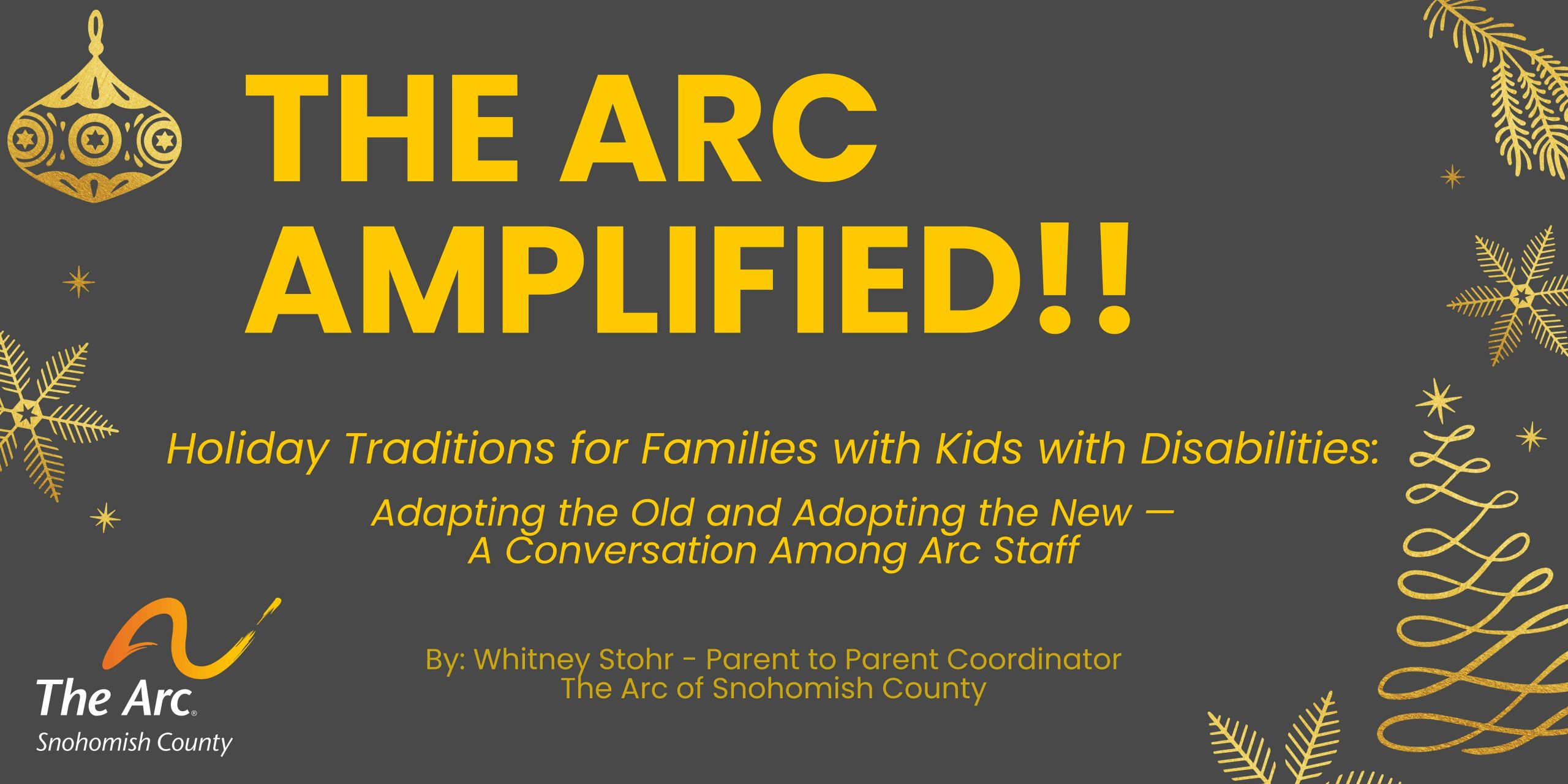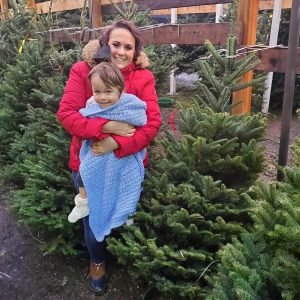
Holiday Traditions for Families with Kids with Disabilities:
Adapting the Old and Adopting the New — A Conversation among Arc Staff
Near the beginning of this holiday season, a colleague reached out with the suggestion for a blog post on holiday traditions and how traditions can change when your child, or another family member, has a disability. She shared how parents of kids with disabilities can feel pressure during this time of year to join in “traditional” holiday events, even when they are not a good fit for their family. (It really was a good idea for a blog post. Thanks, Courtney Criss. I appreciate you!)
This idea prompted my own thinking, too, about traditions — those that have changed due to my son’s disability and those we had once hoped to begin, but never did for the same reason. Honestly, I try my hardest during the holiday season not to think too much about traditions. The Christmas season has always been my favorite time of year. I love everything about the extended time between Halloween and New Year’s, and it still hurts to consider the traditions our family has missed.
A few days after having this conversation with my colleague, I was in a meeting with parent-caregiver collaborators and an ice-breaker question was posed: “What is your favorite holiday tradition with your kids?”
Oy….
Here is my honest answer: I do not have one.
I do not have a single, favorite holiday tradition, or really, any long-standing tradition with my son because we have not had time to create them. My son was born in early 2018, and we spent the first two years of his life in and out of the hospital. He was too weak and prone to illness to engage in much of anything during those early years. Then, right as he was growing into stability, and my husband and I began to look outward again at the world, the pandemic hit with full force. We turned around, walked right back into isolation, and haven’t left yet.
So, regarding the question of holiday traditions: Admittedly, I carry some grief on this topic. I grieve the traditions that I once hoped to start with my family. I grieve the time that was lost during those first holiday seasons, as we bounced from medical appointment to medical appointment, and otherwise lived in a bubble to limit early exposure to the type of cold viruses that would surely land us in intensive care. And, like much of the world, I grieve the loss of the past two years when nothing has been the same and, perhaps, never will be quite the same. That grief continues…
But, certainly, if this topic of traditions was weighing on the mind of my colleague, who is also the mother of young children, and if a question about favorite holiday traditions hit my emotional core like a ton of bricks… then, certainly, this is a topic that must impact others within our larger community of parent- and family-caregivers.
I posed these questions to our staff here at The Arc of Snohomish County:
How have you changed or adapted “traditional” holiday events because a member of your family has a disability? Are there any new traditions you have created specifically to accommodate your family’s needs?
The answers centered on a few main points.
First: Ambient modifications; that is, altering the environment, or the setting, of holiday celebrations to be more inclusive to all family members. For Luz Cobián, Hispanic Outreach Coordinator, this meant playing softer music during festivities. Teri McKeehan, Community Connections Coordinator, shared how her family began hosting festive events at their home with smaller groups of people, who understood their needs and could celebrate alongside their family.
Second: Rethinking event attendance; meaning, thinking ahead about how it might be possible to attend holiday events and family gatherings, while having a contingency plan in place if anything changes. Teri shared again how, when attending holiday gatherings, her family would take two cars, so one parent could leave early with their daughter, if needed. Courtney Criss, Independent Living and Housing Coordinator, shared how difficult large gatherings can be for her son, who has a disability. Her family will sometimes attend events separately. Her daughters enjoy visiting downtown Seattle or Snowflake Lane in Bellevue, but these events are harder on her son. For this reason, she is searching for opportunities to establish smaller, more intimate, traditions with the entire family.
Third: Giving up traditions. This is a hard one, and yet, coming to know that it is time to give up a long-held or deeply meaningful tradition is not uncommon among families of kids with disabilities and complex medical needs. You can see it when something you once enjoyed as a family now brings only stress and anxiety. It is easy to try to hold on to these traditions; to will them into being at any cost…. And then, the day comes when forcing a tradition that no longer works for your family is simply not worth the toll it takes on your mental health. For me, giving up old traditions was the most difficult part of becoming a Medical Mom. For my family, this meant ending our holiday celebrations at my parents’ home on the Oregon Coast. The coastline is simply too far from the type of emergency medical care my son may need, and the idea of making that trip generates more anxiety than excitement. It was hard to let go of that tradition, and it is okay that it was hard.
Fourth: Finding new traditions that work for everyone in the family. This was a shared goal among staff members. Many talked about their tradition of driving around to look at Christmas lights. This is always a winning idea because you are in charge of everything — the route and the drive-time — and you can simply go home when the fun ends. Courtney shared how her family of six will drive their van around in search of “Christmas houses” while listening to carols and drinking peppermint milkshakes. (Yum!)
Staff also shared traditions they built around their kids’ interests. Nicki Solie, Special Education Coordinator, puts her son in charge of decorating the family Christmas tree with *all* the colors! He also sets up her Christmas village each year, and the family rides the monorail to visit the mall and the train display at Seattle Center.
Luz talked about her “proud mama moments” when family members recognize the ways in which her son can participate in family activities.
 Jessie Moore, Leadership Development Coordinator, shared how her family spends time outdoors each winter, building snow people, making snow angels, sledding and cruising around in their off-road buggy. Each year, they take on a special “holiday project,” and as a family, they also enjoy The Lights of Christmas event in Stanwood.
Jessie Moore, Leadership Development Coordinator, shared how her family spends time outdoors each winter, building snow people, making snow angels, sledding and cruising around in their off-road buggy. Each year, they take on a special “holiday project,” and as a family, they also enjoy The Lights of Christmas event in Stanwood.
My family is still working on building traditions, but we are getting there. During these past two years in pandemic isolation, my family has visited a tree farm to cut down a real Christmas tree that we decorate with homemade ornaments. My son opens an Advent Calendar filled with toy trinkets, and on St. Nicholas Day, Santa stops by for a visit outdoors. While these experiences are still new to us, I feel like we are, at least, planting the seeds of tradition. I hope that is the case.
Without question, the holiday season can elicit many complex emotions. This is true, of course, not only for family caregivers, but for every person, who may experience both joy and grief; glee tinged with feelings of melancholy; hope and disappointment — all existing simultaneously. And, it is even more challenging when you yearn to establish family traditions, but your family dynamic makes many of the typical, holiday traditions… just… unworkable.
 This is hard stuff.
This is hard stuff.
It is hard to abandon your favorite traditions — especially if they were passed down through generations of family.
It is hard to always think ahead and to spend time creating elaborate plans of action that will allow your family to attend basic, holiday events… (“Maybe. If everything goes just right. Or not. We’ll wait and see.” Right?! If you know, you know.)
And, it is REALLY hard when you watch other families *not* have to do these things. They can attend a church cookie exchange party without making a situation specific, emergency plan. What?! They probably do not call ahead to a hotel to ask the desk clerk about the emergency response time from the nearest fire station. Do concerns about sensory overload or wheelchair accessibility ever cross their minds? I do not know….
Yes, the holidays can be hard for parents and family caregivers of children with disabilities. If you are one of those caregivers: Please know that you are not alone in those feelings. You are, in fact, in quite good company, if I do say so myself. (And I do say so!)
So, what can we do?
 Celebrate the wins — If you find something that works for your family, build it into a tradition. Create new traditions that work for your family. It is not required that traditions be passed down through generations. Every tradition began somewhere!
Celebrate the wins — If you find something that works for your family, build it into a tradition. Create new traditions that work for your family. It is not required that traditions be passed down through generations. Every tradition began somewhere!
Engage your kids in ways that work for them — Anything can be a tradition! If your child has a specific interest, or loves one particular thing about the holiday season, grasp onto it and cultivate that interest. Find ways to celebrate the holidays by amplifying interests that are already there.
Keep trying — If something does not work, move on. It is okay if your BRILLIANT attempt at creating a last memory falls flat. Keep trying. It really is the “try” that matters.
And remember: You are doing awesome. You are doing your best. Your family sees that.
However you celebrate… Whatever traditions you hold… I wish you a wonderful holiday and a hope-filled, winter season.
**********
Whitney Stohr is a Parent to Parent Coordinator at The Arc of Snohomish County. She is passionate about advocating for medically complex children and children with disabilities and their families. She is a mom and medical caregiver herself, who is energized by working closely with other parent/family caregivers. She lives with her three-year-old son Malachi and husband Jason in Lynnwood. Connect with her online at whitney@arcsno.org.

